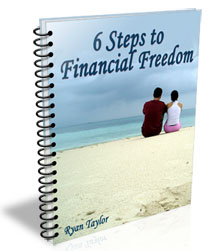Becoming totally debt free is an unbelievable accomplishment and a great achievement for those who are disciplined to pay down their debts. Is it really smart though to become completely debt free?
Depending on your financial situation, you might be better off hanging on to some of your loans and spreading your payments over time. Take student loans for example, which are some of the cheapest forms of long term debt. If you have multiple student loans, consolidating the loans and negotiating longer repayment terms might be the prudent move over paying off the loans in full. Here’s why:
- Up to $2,500 in interest paid on your student loans is tax deductible if you meet income requirements.
- A 10% return from an investment is greater than the 5% interest you are paying on the student loan. Reinvest your earnings back into your investment, and over time compound interest kicks in to generate massive gains.
- If you invest the money in a tax sheltered IRA or 401k instead of paying off the loan, you are investing pre-tax money, which lowers your realized income - which means you pay less income taxes. You could also take advantage of company matching programs if offered by your employer’s 401k plan.
- Student loans are the lowest forms of debt. If they are not they should be, so consolidate the loans. Focus on paying off all other loans first before even considering paying down your student loans.
If you have no other debts and are in the position to pay down a big chunk of your loan, or pay it off entirely, you are really in a win-win situation. You could choose to invest that money to help boost your wealth accumulation, or you could give yourself peace of mind by paying the debt off entirely. Either way, you are making a wise decision with your money and you have put yourself in a great position to have these options.
The same holds true with low, fixed rate mortgages. Wouldn’t it be great to have no housing expenses? Owning your home free and clear would greatly improve your personal income-to-debt balance sheet, or cash-flow. On the flipside, it is possible to invest that money to earn more money while time and compound interest make you even wealthier.
For info on consolidating your student loans, visit www.finaid.com and Sallie Mae. Money Magazine also offers a student loan calculator to determine how quickly you can pay off your student loans by making a higher monthly payment.
Millionaire Money Habit: If you are in a position to pay off your remaining low-interest loans in order to become debt-free, remember to consider the tax incentives for continuing to pay interest on your loans over time. Is being completely debt free more satisfying to you than investing the money you have to pay off the loan in order to accumulate more wealth?
Looking for the best rates for loans? Thrifty Loans has access to over 200 loan plans



5:33 pm on December 28th, 2007 1
Just stumbled on your blog accidentally… Don’t have any loans personally, but as I watch Suze Orman occasionally, I thought I’d mention that your student loan advice goes against what she is saying.
As I understand it, there are two kinds of student loans - subsidized and private. While subsidized loans carry low fixed interest, the private loan can have high interest that can go up. Additionally, as she is saying, unlike other loans, student loans cannot be dismissed with bankrupcy or in any other way, and they have power to go after you in any way e.g. garnish your wages. So according to her, paying off private student loans shall be high priority.
Just thought I’d mention it.
9:10 pm on December 28th, 2007 2
Good points worth mentioning. To clarify on the different types, federal loans can be subsidized or unsubsidized and carry relatively low interest rates. They can also be consolidated to lock in even lower rates.
A subsidized federal loan basically means the government pays the interest on the loan while you school. With unsubsidized loans, you are responsible for the interst that accrues while you are in school.
Then there are private loans, which you can take out after there are no more of the prefered federal loans to obtain. These are the ones that can carry the heavy interest rates.
I believe it is pretty rare to borrow the max federal loans and still have a need for additional funding, but then again I did when I went through college. However my private loan was a small fraction compared to my federal loans.
11:28 am on January 3rd, 2008 3
The only addition I’d throw in is to evaluate the risk involved in both directions. Putting the money into investments if those investments return more than the loan % is good. Just be careful that you don’t LOSE money on the investments. Then you get double-whammied. The investment loss AND the interest payments. It might take quite a bit to make up that if the investment loss was significant.